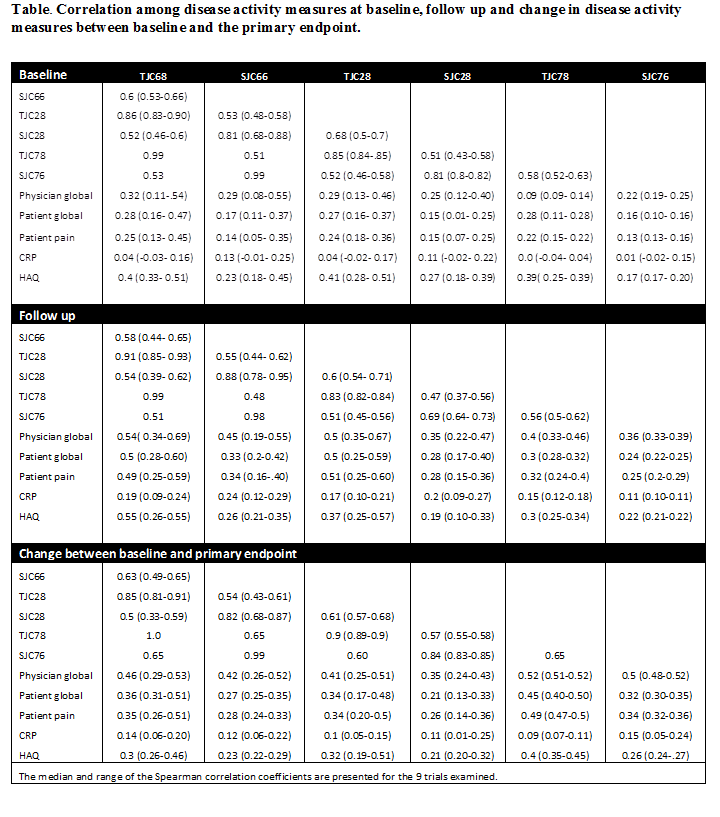Session Information
Date: Sunday, October 21, 2018
Session Type: ACR Poster Session A
Session Time: 9:00AM-11:00AM
Background/Purpose: Joint counts are central to the measurement of musculoskeletal disease activity in psoriatic arthritis (PsA). Few studies have addressed whether the three most commonly used joint counts: 66/68-Swollen and Tender Joint Counts (SJC66/68TJC), SJC28/TJC28 and SJC76/TJC78, are valid for the measurement of musculoskeletal disease activity. To test the construct validity of the joint counts, we examined the correlations between the joint counts and other variables associated with MSK disease activity. We hypothesized that joint counts would be strongly correlated (rho 0.8-1) with each other, moderately correlated (rho 0.6-0.8) with the physician global assessment (PhGA), and mildly correlated (rho 0.4-0.6) with patient global assessment (PtGA), pain, health assessment questionnaire disability index (HAQ-DI) and C-reactive protein (CRP).
Methods: Data were requested from 8 phase III randomized controlled trials (RCTs) and the TIght COntrol of Psoriatic Arthritis (TICOPA) trial. A priori, a standardized protocol was designed to study construct validity. Spearman’s correlation coefficients were calculated (all data were skewed/nonparametric) at baseline and the primary endpoint (12-16 weeks for most RCTs, 24 weeks for TICOPA) between the following variables: TJC28, TJC68, TJC78, SJC28, SJC66, SJC78, PtGA, pain, PhGA, HAQ-DI and CRP. We also calculated Spearman’s correlation coefficients between changes in each of the variables from baseline to follow up.
Results: The SJC28 was moderately to strongly correlated with SJC66 and SJC76 at baseline and follow up and changes in SJC28, SJC66, and SJC76 were moderately correlated (Table). Similarly, the TJC28 was strongly correlated with TJC68 and TJC78 at both time points as well as among changes in the joint counts between baseline and follow up. There were mild-to-moderate correlations between SJC and TJC at both time points and similarly changes in joint counts were moderately correlated. The joint counts had low to moderate correlations with PhGA in all three scenarios and correlations with PtGA and pain were low to moderate, depending on the RCT. Finally, correlations between joint counts and CRP were low in all three scenarios.
Conclusion: These results indicate that SJC and TJC have construct validity and replicated most of the pre-hypothesized relationships with other variables of importance in RCTs. While good correlation between TJC and SJC subsets were identified, the TJC68/SJC66 is recommended by the GRAPPA-OMERACT working group for measurement of peripheral arthritis in PsA.
To cite this abstract in AMA style:
Duarte-Garcia A, Eder L, Stephens-Shields A, Goel N, de Wit M, Gladman DD, FitzGerald O, Helliwell P, Leung YY, Mease PJ, Orbai AM, Shea B, Strand V, Tillett W, Coates LC, Ogdie A. Construct Validity of the Swollen and Tender Joint Counts for the Measurement of MSK Disease Activity in Psoriatic Arthritis [abstract]. Arthritis Rheumatol. 2018; 70 (suppl 9). https://acrabstracts.org/abstract/construct-validity-of-the-swollen-and-tender-joint-counts-for-the-measurement-of-msk-disease-activity-in-psoriatic-arthritis/. Accessed .« Back to 2018 ACR/ARHP Annual Meeting
ACR Meeting Abstracts - https://acrabstracts.org/abstract/construct-validity-of-the-swollen-and-tender-joint-counts-for-the-measurement-of-msk-disease-activity-in-psoriatic-arthritis/

